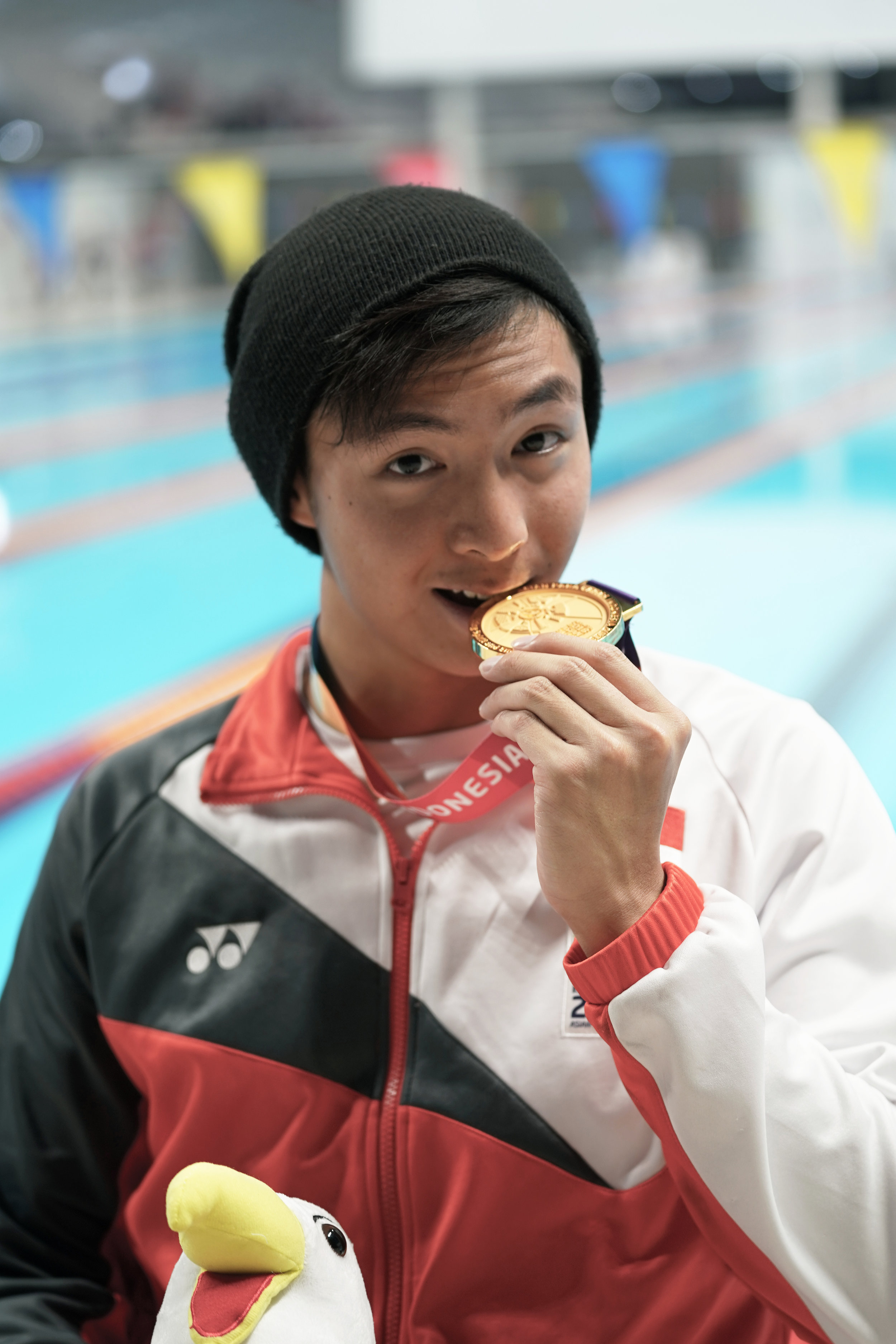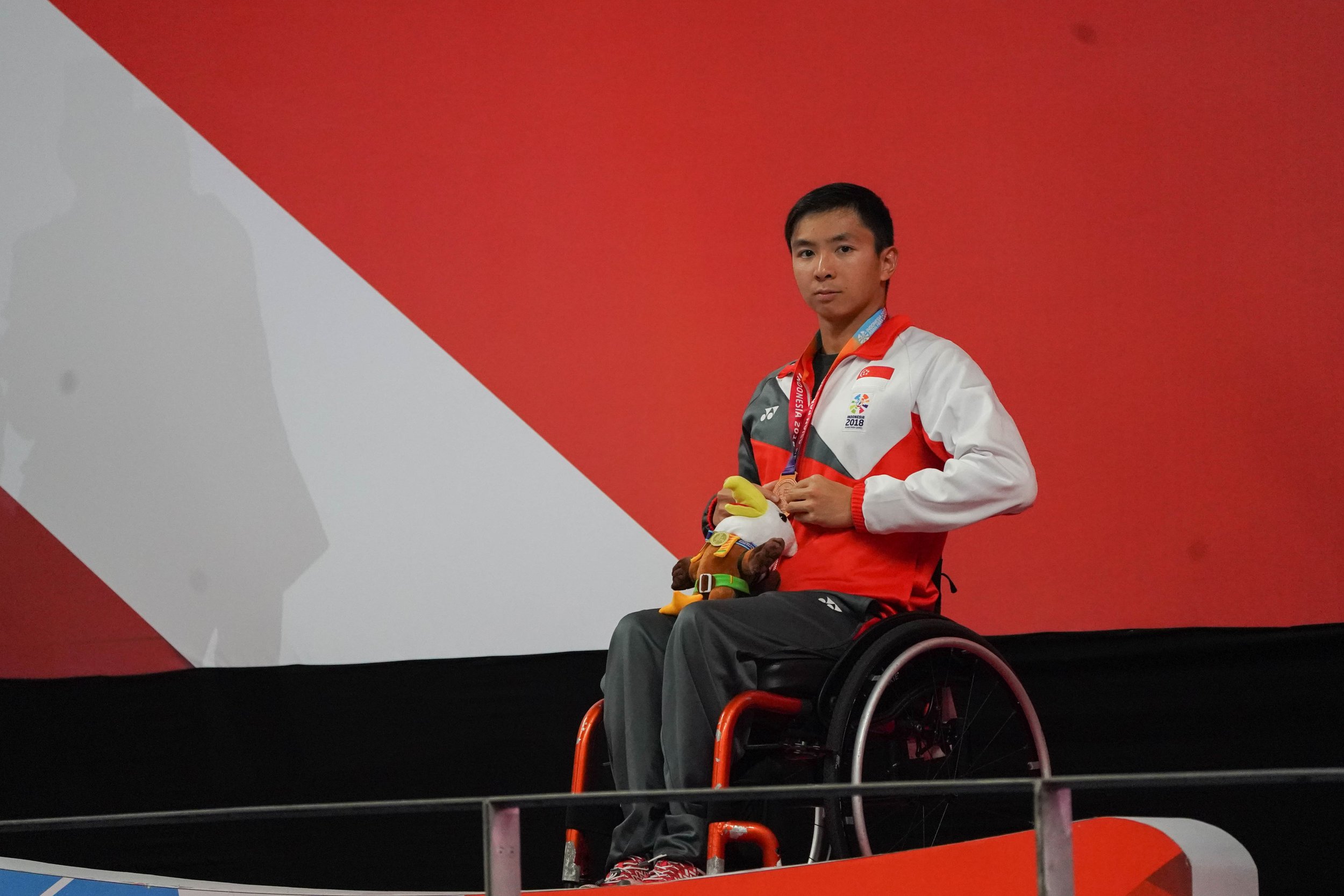Staying Afloat
“It’s true that I can’t play soccer as well or run as fast as others, but they can’t swim as fast.”
written by germaine leow | photos by singapore national paralympic council
Diagnosed with Transverse Myelitis, a rare neurological condition caused by the inflammation of the spinal cord which has affected his lower nervous system, Toh Wei Soong, 20, lost the ability to walk at the age of two.
Despite that, Wei Soong spent most of his life in the water. He started swimming since the age of one and was even baptised in the pool that same year. There were spurts of years when he trained every week and years when he didn’t. It finally came to a point where he started to take swimming more seriously – not as just a recreational sport but something he could do competitively.
It all began with his first swimming competition when he was 13. Wei Soong represented his school then, Anglo Chinese School (Independent), in the National Para Swimming Championships.
“That experience was what gave me the passion and the drive to say: ‘Yes, this is something I would like to do for the next few years of my life,’” Wei Soong said with so much joy at the prospect of representing his school and doing well for them.
While the initial joy from his first swimming competition kept him going for the next few years, Wei Soong’s love for swimming was deep rooted from the very start.
Why swimming, of all sports? His answer was enthralling, like the embodiment of water itself.
“I think swimming, more than most sports, has a great equality of ability, especially for para athletes. Regardless of whether you can walk or run on land, in swimming you are just about the same as anyone else - you can float.”
Like most people, swimming was just a weekend hobby for Wei Soong. That was, until his talent dawned upon him and he realised it was something he could do professionally.
“Swimming got so entrenched in my lifestyle that it in itself is a way of life. The idea of not swimming is the idea of not going out into the sun – it’s impossible.”
While Wei Soong has been blessed with endless support from his parents, friends and school, success did not come easy for him. Just like every other Singaporean athlete his age, he’s had to juggle training sessions, school work, his commitments with swimming and the people that matter to him.
Despite his physical condition, Wei Soong has never felt that he’s more challenged than other athletes. Contrary to expectations, his biggest challenge so far has not been the least bit physical.
“My greatest challenge has been myself and the idea of pushing myself to get over the emotional, psychological and physical problems that inevitably come alongside growing up,” he expressed. “That fight is an internal one and no one else can fight it for you.”
There were certainly moments that took a toll on him, even to the point where he considered giving up. When asked about how he overcame them, he simply advised: “You just have to plunge your feet in and try to weather the struggle that is going to come against you because you’ll realise that you are going to struggle and there is no real escape from it.”
He reasons that most of the struggles we face stem from choices we make - he chose to swim and to face the challenges that come with it. “Once you have a reason for the suffering, the suffering doesn’t seem so bad,” he said.
Although Wei Soong’s grit and determination played a huge part in getting him to where he is now, he shared that the key to his success has been his parents.
“They have been the bedrock of my success. More so than anyone else, more so than my training, coaches or teachers.
Wei Soong has never once considered his condition a loss.
“It’s true that I can’t play soccer as well or run as fast as others, but they can’t swim as fast,” he said thoughtfully.
He shared that he has friends living with depression who consider him an inspiration because despite his physical condition, Wei Soong’s mental and psychological condition is stronger than most.
“After a while, you realise that everyone has a disability in a certain sense and no one is equal – it’s simply a case of them not being as obvious.”
He might have lost his ability to walk but he has gained willpower and strength that other people may lack and that ultimately has led him to a greater gain – becoming a gold medalist Paralympic swimmer.
“My disability has never been a true disability, rather, another way of living life,” Wei Soong pointed out.
Although it is clear that he is happy and content, is there anything he would like to change in his life? He replied with a chuckle: “I probably want to be a bit taller, but for the most part, I live quite a nice life.”
Wei Soong believes that having fulfilment is more important than being happy.
“If we were to live happy all the time, we would not be human,” he said.
When asked to describe his journey in one word, he uttered with conviction after much thought. This word: “indebted”.
Though simplistic in its solitude, this word sums up his story thus far. He believes that he owes his success to everyone and everything that has played a part in his journey to success.
“When you stand on the podium with your medal and the crowd is cheering for you, that moment, that success, does not belong to that moment but rather, belongs to the moments before it. The time at the pool, the time at home, all the times that have led up to this one moment.”








